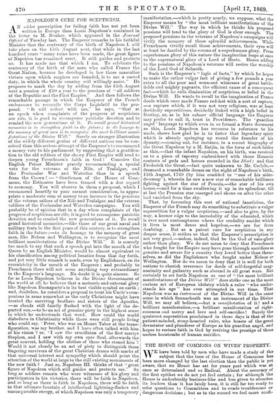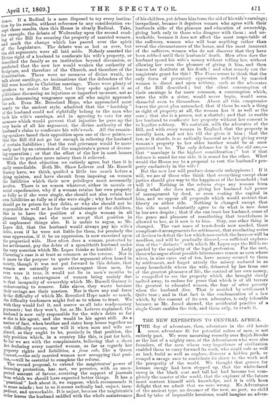THE HOUSE OF COMIONS ON WIVES' PROPERTY.
have been told by men who have made a study of the
subject that the tone of the House of Commons has been more changed by the last election than the public is yet aware, that no House has sat for years past which was at once so determined and so Radical. About the accuracy of the first epithet we do not yet feel certain ; for although the House is undoubtedly business-like and less given to abandon its leaders than -it has lately been, it is still far too ready to refer questions to Committees and to evade troublesome or dangerous decisions ; but as to the second we feel more coofi deuce. If a Radical is a man disposed to try every institution by its results, without reference to any consideration except those results, then this House is clearly Radical. Take, for example, the debate of Wednesday upon the second reading of the Bill for securing the property of married women, and mark the change which has passed over the spirit of the Legislature. The debate was as hot as ever, but the old arguments were all laid aside. Nobody asserted the Divine right of a husband to confiscate his wife's property, or described the family as an institution beyond discussion, or predicted that the new law would weaken the authority of Scripture, and therefore of the Church, and therefore of the Constitution. There were no menaces of divine wrath, no talk about sacrilege, no insinuations that the defenders of the Bill were hostile to Christian marriage. There were plenty of speakers to resist the Bill, but they spoke against it as politicians discussing an injurious or imperfect measure, not as priests denouncing vengeance upon all who might approach the ark. Even Mr. Beresford Hope, who approached most nearly to the ancient style, admitted that the " lordship " of the husband could not rightfully belong to the man who took his wife's earnings, and in agreeing to vote for any measure which would prevent that injustice he gave up the very basis of all his argument, the divine authority of the husband's claim to confiscate his wife's cash. All the remaining speakers based their opposition upon one of three points,— that the Bill did not go far enough in relieving the husband of certain liabilities ; that the real grievance would be more easily met by an extension of the magistrate's power of decreeing separation ; or that the effect of the law in most homes would be to produce more misery than it relieved.
With the first objection we entirely agree, but then it is easily remediable. Both Mr. Shaw Lefevre and Mr. Russell Gurney have, we think, quailed a little too much before a dying opinion, and have shrunk from imposing on women the liabilities which their new privileges must necessarily involve. There is no reason whatever, either in morals or social expediencies, why if a woman retains her own property as fully as if she were single, she should not also retain her own liabilities as fully as if she were single ; why her husband should go to prison for her debts, or why she should not be responsible as well as he for the maintenance of the children. She is to have the position of a single woman in all pleasant things, and she must accept that position in all unpleasant things also. It is unfair to argue, as Mr. Lopes did, that the husband would always pay his wife's debts, even if he were not liable for them, for precisely the same oppression, if it be an oppression, is now exercised upon the propertied wife. How often does a woman, protected by her settlement, pay the debts of a spendthrift husband under the very coercion which Mr. Lopes thinks so horrible ? Lady Clavering's case is at least as common as the reverse. Nor is it more to the purpose to quote the argument often heard in society, though it was not put forward in this debate, that women are naturally more extravagant than men, for even were it true, it would not lie in men's mouths to Idler it, the extravagance of women being mainly due to that incapacity of ownership which Mr. Russell Gurney is endeavouring to remove. Like slaves, they waste because their savings are their masters. Nor is there any real force in the difficulty of which Mr. Beresford Hope made so much, the difficulty tradesmen might feel as to whom to trust. We Wish they would feel it, and coerce us all into ready-money
Payments; but they won't, for, as Mr. Lefevre explained, the husband is now only responsible for the wife's debts so far
as she is his agent, and she would be his agent still. As a matter of fact, when brother and sister keep house together no such difficulty occurs, nor will it when man and wife arc
Placed, as they ought to be, precisely in that position, the only position which, in a country like this, is just for both. So far we are with the complainants, believing that a short Act declaring every married woman, as far as regards her Consort,—the rights and liabilities, a fans sole, like a Queen '°11aort,—the only married woman now occupying that position,—wal be essential to complete the reform.
The second proposal, to extend the magistrates' power of decreeing protection, has met, we perceive, with an unexpected amount of favour, receiving the support of journals 'Iva 'which we should have expected better things. It has a Practical" look about it, we suppose, which recommends it to some minds ; but to us it seems radically bad, unjust, inexPedient, and unworkable. It is unjust, because the magistrate's °rder leaves the husband saddled with the whole maintenance of his children, yet debars him from the aid of his wife's earnings; inexpedient., because it deprives women who agree with their husbands alike of the pleasure and education of ownership, giving both only to those who disagree with them ; and un workable, because it does not affect the most respectable of the sufferers, women who will bear anything rather than reveal the circumstances of the home, and the most innocent of the sufferers, women who do not discover that they have been robbed until their husbands' death. How often does the husband spend his wife's money without telling her, without allowing her even the pleasure of giving it him, and then leaves her destitute at his death ? and what remedy can the magistrate grant for this The Times seems to think that the only form of pecuniary oppression suffered by married women is direct and open robbery, such as the advocates of the Bill described ; but the silent consumption of their earnings is far more common, a consumption which,. were the wife a sister, would never begin, would seem shameful even to themselves. Above all this, compromise leaves the great plea untouched, that if there be such a thing as right of property at all, the woman has it as well as the man ; that she is a person, not a chattel ; and that to enable her husband to confiscate her property without her consent is to legalize robbery. We maintain, with the advocates of the Bill, and with every woman in England, that the property is morally hers, and not his till she gives it him ; that the law, as it stands, is as radically immoral as a law giving every woman's property to her elder brother would be at once perceived to be. The only defence for it is the old one,— that " marriage is the highest consideration ;" but if that defence is sound for one side, it is sound for the other. What would the House say to a proposal to vest the husband's property exclusively in the wife ?
But the new law will produce domestic unhappiness ? If it will, we are of those who think that everything except clear justice should give way to the happiness of the household ; but will it ? Nothing in the reform stops any woman from doing what she does now, giving her husband full power of management by deed, or even vesting the capital in him, and we oppose all proposals which would restrict that liberty on either side. Nothing is changed except that the wife must voluntarily agree to do what is now done in her own despite ; that if she can trust her husband, some of the grace and pleasure of manifesting that trustfulness is allowed to her, as it now is to him. Stay, one other thing is changed. The vast mass of trust-deeds now needed, those complicated arrangements for settlement, that everlasting series of devices to defeat the law which nowenrich the lawyers will be needless, and will be gradually disused,—a sufficient explanation of the " distaste " with which Mr. Lopes says the Bill is re garded by the majority of the legal profession. For the rest, those who argue about possible bitternesses reason as men whose wives, in nine cases out of ten, have money secured to them by settlement, and forget utterly the misery endured in so many households where the wife, debarred by law from one of the greatest pleasures of life, the control of her own money, is compelled to see the property which she brought slowly
melted away, to endure for years that which is of all terrors the greatest to educated women, the fear of utter poverty when the husband dies. That is avoided by settlement f Quite true ; and in that fact is the condemnation of a law which, by the consent of its own advocates, is only tolerable because, as Mr. Jessel showed, the accidental practice of a single Court enables the rich, and them only, to evade it.



































 Previous page
Previous page